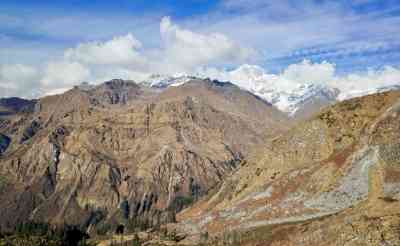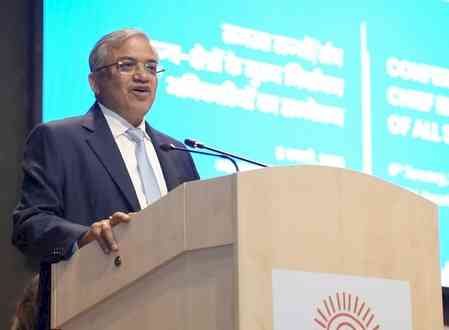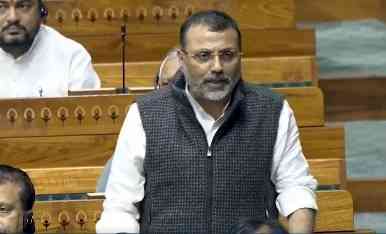One lakh saplings to be planted in Himalayas on single day
One lakh saplings, 90 per cent of them are of willow and poplar species, will be planted in the arid Ladakh region on May 17 with an aim to achieve its 85-90 per cent survival rate, volunteers of the plantation drive said on Sunday.

VISHAL GULATI
Leh, May 7 (IANS) One lakh saplings, 90 per cent of them are of willow and poplar species, will be planted in the arid Ladakh region on May 17 with an aim to achieve its 85-90 per cent survival rate, volunteers of the plantation drive said on Sunday.
A record-breaking 150,000 plus trees have already been planted in the Ladakh region and they are thriving under the care of the Kung Fu nuns, led by Gyalwang Drukpa, the spiritual head of the 1,000-year-old Drukpa Order based in the Himalayas.
To achieve the high survival rate of sapling in the land of extremes, where rainfall is rare and water, essential for irrigating the farmlands and household chores, mostly comes from melting snow, a solar-powered micro irrigation system has been installed with the local administration support.
The community non-religious plantation drive named 'Trees for Life' is backed by international network of non-profit organisations, Live to Love, whose volunteers, comprising Buddhist monks and nuns, twice broke the Guinness World Record for most trees planted simultaneously.
In 2012, Live to Love, founded by the Gyalwang Drukpa, a recipient of UN's Millennium Development Goals Award for his humanitarian and environmental work, entered its name in the Guinness World Records history by breaking a record of the Philippines for "Most Trees Planted Simultaneously" by planting 99,103 Ladakhi willow saplings by involving 9,814 volunteers near the world-famous Hemis monastery in less than an hour.
Previously, 9,033 volunteers of Live to Love planted 50,033 saplings in October 2010. The Philippines had planted 66,000 saplings within an hour in January 2011.
A spokesperson for Live to Love told IANS the plantation drive will be performed over an area of 60 acres in Liktsey, a small hamlet with some 30-odd mud-brick houses, where villagers are largely growing barley and apricots, by involving some 5,000 volunteers, comprising government officials, leaders of various faiths, locals besides Kung Fu nuns and international volunteers.
They will plant saplings in specially dug pits. A majority of the saplings are of Ladakhi willow and poplars.
"We are also planting fruit-bearing saplings mainly of apricot, apple, plum, walnut and pears. To reduce vulnerability of saplings to drought-like situations and improve their survival rate, a high-efficiency irrigation system has been set in place by the local administration. For this, water will be lifted from the nearby Indus river," he added.
Ladakh is a cold arid desert on high altitudes where the annual precipitation is between 100 and 150 mm, inadequate to meet the average moisture requirements of the plants.
According to Live to Love, the campaign will green Ladakh's barren lands, create natural watersheds, reduce erosion of soil, and mitigate devastating flashfloods and landslides. Animals will have habitats and Ladakhi communities will be able to enjoy lush forests.
Volunteers of Live to Love from Nepal and Bhutan will participate in the May 17 initiative.
Earlier, two mass plantation drives were carried out in Changa village, nearly 40 km away from Leh town, where there is a thick forest cover now.
In 2012, His Holiness the Gyalwang Drukpa personally joined the record-breaking attempt to encourage participants.
"It is totally a non-religious initiative to be carried out under the guidance of Gyalwa Dokhampa, who is coming from Bhutan," said the spokesperson.
The young spiritual leader Gyalwa Dokhampa believes Buddhism is not a religion but a way to find happiness. Based in Bhutan and Nepal, he teaches worldwide and brings a young viewpoint to traditional teachings.
As a spiritual teacher, he loves to interact with the youth on preserving the environment.
"During our walking experience in Ladakh in the Himalayas, we saw how much rubbish trekkers left behind which went into the water streams. These water streams are the source of about 30 to 40 per cent of the world population. Our goal was to pick up all of the non-biodegradable garbage," Gyalwa Dokhampa had told IANS in one of his recent interviews.
As a spiritual leader with a deep commitment to action, Gyalwa Dokhampa, who spent his initial years in Darjeeling and shared his knowledge with students in the US, Europe, Vietnam, Malaysia, Hong Kong and Singapore, has published numerous books of interest.
(Vishal Gulati can be contacted at [email protected])



 IANS
IANS 










